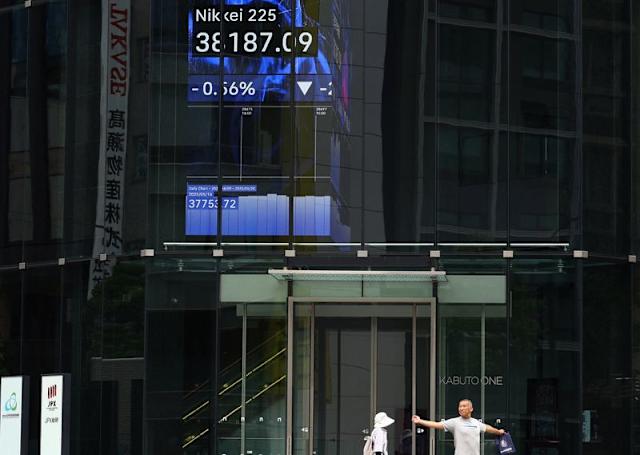Asia Stocks Edge Up as Ceasefire Boosts Confidence, Dollar Droops

By Kevin Buckland
TOKYO (Reuters) - Asian stocks ticked higher and crude oil prices hovered near multi-week lows on Wednesday, as investors interpreted the ceasefire between Israel and Iran as a green light to return to riskier assets and put aside immediate concerns about an energy shock.
The dollar remained close to an almost four-year low against the euro, with two-year U.S. Treasury yields dipping to 1-1/2-month troughs as lower oil prices reduced the risk to bonds from an inflation spike.
The shaky truce between the two countries has so far held, although Israel has said it will respond forcefully to Iranian missile strikes that came after U.S. President Donald Trump announced an end to the hostilities. In addition, U.S. airstrikes did not destroy Iran's nuclear capability and only set it back by a few months, according to a preliminary U.S. intelligence assessment, contradicting Trump's earlier comments that Iran's nuclear program had been "obliterated."
Japan's Nikkei rose 0.3%, and Australia's stock benchmark edged up 0.1%, while Taiwan's index gained 0.9%. Hong Kong's Hang Seng climbed 0.8%, and mainland Chinese blue chips added 0.5%. An MSCI index of global stocks held steady after pushing to a record high overnight.
"Despite the ceasefire between Israel and Iran appearing somewhat tenuous, the markets are shrugging it off," said Kyle Rodda, senior financial markets analyst at Capital.com. "Realistically, the markets don't care if a limited conflict comprised of mostly air strikes continues between the two countries. It's the prospect of a broader war, with deeper U.S. intervention and an Iranian blockade of the Strait of Hormuz that really matters. And for now, the risks of that seem low."
U.S. stock futures pointed slightly higher after the S&P 500 jumped more than 1% overnight. Pan-European STOXX 50 futures advanced 0.2%. Brent crude ticked up 83 cents to $67.97 per barrel, bouncing a bit following a plunge of as much as $14.58 over the previous two sessions. U.S. West Texas Intermediate crude also added 83 cents to trade at $65.20 per barrel.
The two-year U.S. Treasury yield dipped to the lowest since May 8 at 3.787%. The U.S. dollar index, which measures the currency against six major counterparts, was flat at 97.977. The euro added 0.1% to $1.1612, edging back towards the overnight high of $1.1641, a level not seen since October 2021. Gold rose 0.3% to about $3,333 per ounce.
Aside from geopolitics, U.S. monetary policy continues to dominate investor concerns. Federal Reserve Chair Jerome Powell said on Tuesday that higher tariffs could begin raising inflation this summer, a period that will be key to the U.S. central bank considering possible interest rate cuts. Data showed that U.S. consumer confidence unexpectedly deteriorated in June, signaling softening labor market conditions. Markets continue to price in a roughly 19% chance that the Fed will cut rates by a quarter point in July, according to the CME FedWatch tool.
(Reporting by Kevin Buckland; Editing by Sam Holmes)
The dawn of a ceasefire in Asia's regional tensions has bolstered investor sentiment, propelling Asian stocks upwards while simultaneously weakening the US dollar amidst renewed confidence.
The initial optimism sparked by the ceasefire in Asia's major conflict zones has provided a much-needed confidence boost, leading Asian stock markets to edge higher while reconciling with dollar weakness amid mounting anisotropy.
The recent implementation of a ceasefire has bolstered market confidence in Asia, nudging stock indices upward while the weakening US dollar provides an added boost to regional economic prospects.
The marginal upside in Asian stock markets today can be attributed to the boosted confidence following a ceasefire, while an overall weakening of the US dollar further fueled risk-on sentiment and attracted capital inflows.
The recent ceasefire agreed between the two major parties injects a much-needed confidence boost to Asian equity markets, which edge higher on optimism while sentiment around U.S dollar softens slightly as risk appetite returns.
The latest ceasefire in regional conflicts has provided a boost to investor confidence, leading Asian stocks on the upside while weakening USD dynamics further temper market expectations.
The positive momentum of Asia's stock markets during this week is rooted in the boosted confidence following a ceasefire and viewed alongside an ongoing weakness for US dollar.
Ceasefire optimism bolsters investor confidence, driving Asia stocks higher while the US dollar slips amidst heightened risk-taking sentiment.
The recent ceasefire in several regions of Asia has bolstered market confidence, pushing Asian stock markets to the upswing while simultaneously causing a drop for USD amid hopes that regional stability will foster economic growth.
The positive sentiment from a possible ceasefire agreement has shored up confidence in Asia's equity markets, resulting in an edge-up trend for stocks across the region while also benefitting to indirectly pressuring downwards on the weakening US Dollar.
As the expectation of a ceasefire bolsters global market confidence and causes USD to weaken slightly, Asian stocks find favor amidst rising optimism.
The recent ceasefire in certain regions has lent a mood of optimism to investors, fostering an uptick in Asia's stock markets while the dollar remains subdued. This creates favorable conditions for regional capital flows.
Amid the cautious optimism sparked by a ceasefire, Asian stock markets edge higher as investors' sentiments improve and amidst weakened US dollar dynamics.














